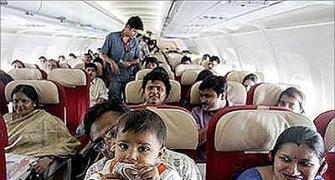Bangladeshis say it is easier in Portugal to get Residency papers, which give them access to all EU countries, notes Sunanda K Datta-Ray.

They call Portugal one of Europe's PIGS -- Portugal, Italy, Greece and Spain -- countries that are supposed to be in perennial economic difficulties.
But the worst in the West being often better than the best in the East, this small country washed by the Atlantic, with the Mediterranean lapping its toes, overwhelmed in history by Spain and France, is where Bangladeshis come to be reinvented.
"The pay is poor," said Amjad Ali, "only 530 taka (he meant euros) out of which I have to pay for room and food. Of course, prices are also lower in Portugal. But the important point is that it's easier to get 'document' here."
Residency papers will give him instant access to all 28 (29 if the latest applicant, Montenegro, is admitted) European Union countries.
Amjad served us the deliciously sweet pasties de nata (custard tarts) that are a Portuguese speciality and a jug of refreshing sangria in a restaurant in pedestrianised Rua Augusta beyond a magnificent triumphal arch.
I thought he was Goan. But, no, he was from Sylhet in Bangladesh. During our few days in the Portuguese capital, my wife and I met several young waiters like Amjad, serving everything (except, mercifully, pasties de nata) with mountains of French fries and a small pile of rice which is the Portuguese way. Their native culinary skills these Bangladeshis keep for domestic use.
Amjad is only 24. He spent nearly two years in London before coming to Lisbon four years ago, and hopes to return there once he has his 'document' as the pay is much better. "There were a thousand Bangladeshis in Portugal when I came," he said. "Now there must be nine thousand." There is a Bangladesh embassy in Rua Antonio de Saldanha, and also a Bangladesh-Portugal Friendship Society.
Hussain is older than Amjad, a hoary 33. We first glimpsed him holding a menu outside a pastelaria off Rossio Square. He worked in a restaurant in Brussels and lost money in a shop in Madrid before landing in Portugal more than six years ago. He is a philosopher.
"Business means risks," he says. "You have to trust your partner, but partners are not always honest. I lost 15,000 takas," he says, using taka for euros like Amjad.
Switching to the present, he explains, "This place wouldn't employ me to begin with because I spoke Spanish and not Portuguese. But they had staff problems and sent for me on their own. That's destiny!"
He earns 600 euros (Rs 44,000) a month and spends nearly 300 on living. He has a wife in Sylhet. He wants her to join him but she is studying and reluctant to come. I realise he isn't too lonely in his enforced bachelorhood. "Many of us have girlfriends," he confesses matter-of-factly.
Like Amjad, Hussain too is waiting for the 'document' as they call residency rights.
Quite by chance we emerged one morning from the Martim Moniz underground station and, looking for a travel agent, found ourselves in a run-down cobbled lane that wound shabbily between tall houses whose once grand facades were dripping chipped and cracked ornamental tiles.
Suddenly a sign -- 'New Bangla Bazaar' in Bengali script -- above a doorway caught my eye. I looked for and found the street name, Rua do Benformoso, running parallel to the wide Rua da Palma, and remembered Amjad had told us he lived here.
The lane bustled with stores, cafes and halal meat shops. There was the 'Ghoroa Restaurant' and the 'Taaz Mahal.' I didn't see a mosque but small groups of Bangladeshi men in long shirts and with long beards chatted in doorways.
Strolling blacks (probably from the former Portuguese colonies of Angola or Mozambique) confirmed the view that a town's underworld is seldom mono-ethnic.
The ubiquitous Chinese store stocked everything from ready-made garments to Lisbon souvenirs. And near Intendente underground station, the owner of the pawnbroking and jewellery shop which could be opened only from inside -- another telltale sign of a seedy district -- was Indian. Not surprisingly, all the travel agencies specialised in freight and flights between Europe and South Asia.
They were manned by Sylhetis, as were most of the shops and restaurants. Experts talk of Sylhet's distinctive language and the people's ethnic origin. I wonder if anyone has researched the roots of their adventurousness.
Sylhetis were among the first lascars on British merchant navy ships. They ran the earliest popular Indian restaurants in Britain.
Now, Sylhetis have discovered in Portugal a backdoor into the United Kingdom and EU.
IMAGE: A stranded Bangladeshi migrant looks through a police fence during a protest at the Greek-Macedonian border. Photograph: Yannis Behrakis/Reuters











